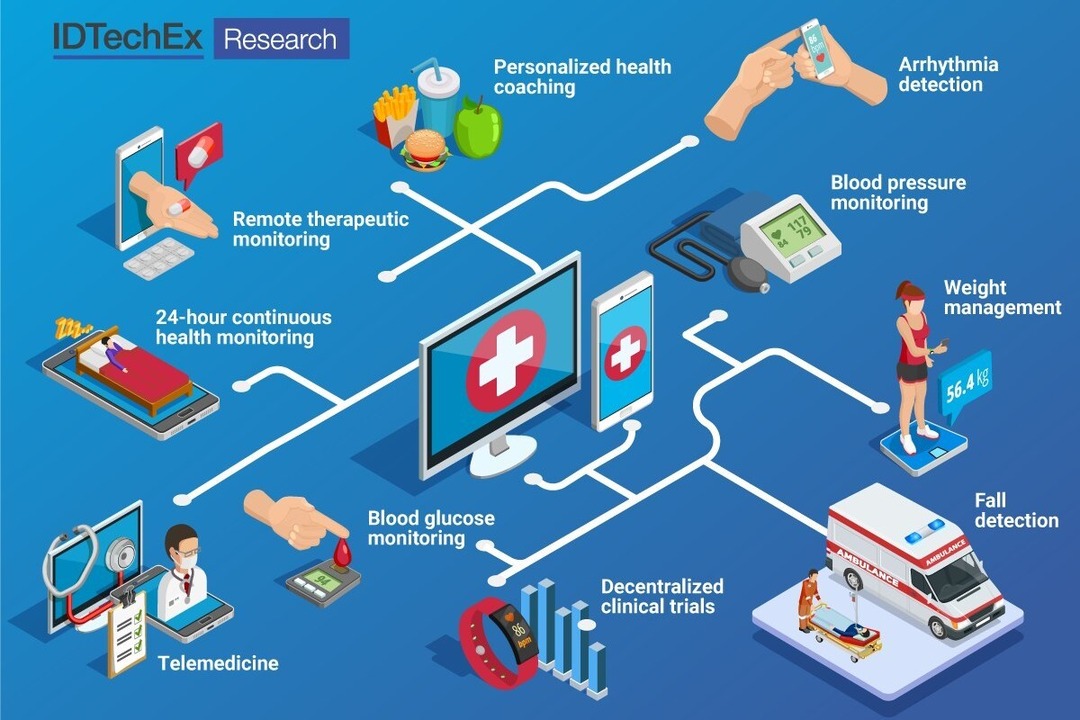BOSTON – As healthcare spending around the world increases, innovative methods of delivering cost-effective healthcare must be developed. Remote patient monitoring (RPM), referring to the use of technology to measure and transmit physiologic data beyond traditional healthcare settings, has emerged as a promising solution to drive down healthcare costs while maintaining a high standard of care for patients.
IDTechEx forecasts the market for devices and technologies supporting RPM to reach US$45 billion by the year 2033. Source: IDTechEx
IDTechEx has released the report “Remote Patient Monitoring 2023-2033: Technologies, Markets, and Opportunities”, covering trends, opportunities, and outlook for the use of wearable and connected medical devices in the remote monitoring of patient’s health parameters, including activity, heart rate, blood pressure, heart rhythm, and blood glucose. IDTechEx forecasts the market for devices and technologies supporting RPM to reach US$45 billion by the year 2033.
Today, RPM technologies and services are centered on major chronic conditions spanning cardiovascular disease, diabetes, and respiratory diseases. IDTechEx’s latest research report on the RPM market covers key technical and commercial trends in medical devices used to monitor and manage patient chronic conditions remotely. These devices span established technologies such as blood pressure cuffs and pulse oximeters to growing segments such as electronic skin patches for ambulatory cardiac monitoring and continuous glucose monitoring. The rise of consumer devices such as smartwatches in health monitoring is also covered.
The main contents covered in the IDTechEx report “Remote Patient Monitoring 2023-2033: Technologies, Markets, and Opportunities”:
- Executive summary & conclusions
- Key drivers and trends for remote patient monitoring market
- Overview of remote patient monitoring companies
- Remote patient monitoring technologies, segmented by disease area/application
- Vital sign monitoring for inpatients and outpatients
- Cardiovascular disease, including technologies used for patients with hypertension, heart rhythm, and heart failure
- Diabetes, including blood glucose monitoring and insulin delivery
- Respiratory conditions, including smart inhalers
- Other chronic diseases targeted by RPM
- Clinical trials
- Elderly monitoring
- Wellness
- 10-year market forecasts across 19 remote patient monitoring product lines/categories
- 63 company profiles, including interviews
Innovations in RPM technology focus on increasing patient comfort, convenience, and adherence to monitoring while maintaining high data quality, and where relevant, providing the option of continuous monitoring. Recent activities from medical and technology giants show their interest in entering the RPM market, bringing with them the much-needed scale needed to support uptake. Increased reimbursement and both patient and physician comfort with the technology (due to the COVID-19 pandemic) can support the continued rise of RPM technologies.
Key aspects of the remote patient monitoring market covered in the report:
– Overview of the remote patient monitoring industry, including key companies and key industry drivers
– Analysis of technology and trends, including key chronic disease applications; examples include:
- Increasing patient comfort and bringing continuous monitoring to hospital wards
- Hypertension and the development of cuffless blood pressure
- Heart rhythm detection and diagnosis and the rise of wearables
- Diabetes and the push towards continuous glucose monitoring
- Opportunities for wearables in movement disorders
- Monitoring the elderly
- Digital biomarkers and decentralized clinical trials
- Health insurance and incentives for wearable technology
- 10-year market forecasts for connected medical devices for remote patient monitoring of chronic conditions, spanning 19 products/product categories

